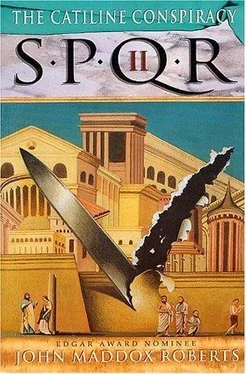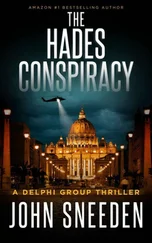John Roberts - The Catiline Conspiracy
Здесь есть возможность читать онлайн «John Roberts - The Catiline Conspiracy» весь текст электронной книги совершенно бесплатно (целиком полную версию без сокращений). В некоторых случаях можно слушать аудио, скачать через торрент в формате fb2 и присутствует краткое содержание. Жанр: Исторический детектив, на английском языке. Описание произведения, (предисловие) а так же отзывы посетителей доступны на портале библиотеки ЛибКат.
- Название:The Catiline Conspiracy
- Автор:
- Жанр:
- Год:неизвестен
- ISBN:нет данных
- Рейтинг книги:3 / 5. Голосов: 1
-
Избранное:Добавить в избранное
- Отзывы:
-
Ваша оценка:
- 60
- 1
- 2
- 3
- 4
- 5
The Catiline Conspiracy: краткое содержание, описание и аннотация
Предлагаем к чтению аннотацию, описание, краткое содержание или предисловие (зависит от того, что написал сам автор книги «The Catiline Conspiracy»). Если вы не нашли необходимую информацию о книге — напишите в комментариях, мы постараемся отыскать её.
The Catiline Conspiracy — читать онлайн бесплатно полную книгу (весь текст) целиком
Ниже представлен текст книги, разбитый по страницам. Система сохранения места последней прочитанной страницы, позволяет с удобством читать онлайн бесплатно книгу «The Catiline Conspiracy», без необходимости каждый раз заново искать на чём Вы остановились. Поставьте закладку, и сможете в любой момент перейти на страницу, на которой закончили чтение.
Интервал:
Закладка:
Only one thing marred the proceedings, and that was the condition of the Temple of Jupiter Capitolinus, where Lucullus was to sacrifice a bull upon being told of the prisoner's death. Two years before, lightning had struck the temple, and the haruspices had been consulted concerning the omen. They had pondered and duly proclaimed that the old statue of Jupiter must be replaced by a new, larger statue, this one facing east, toward the Forum. Once in place, this would aid the Senate and People in detecting plots against the state. On the day of Lucullus's triumph, the statue still stood outside the temple, where a huge hole had been made in the wall. Carefully and painfully, an inch at a time, it was being moved toward the hole.
The reason for my privileged position atop the Rostra was my office. I was quaestor that year, the lowest of the elected officials. Other quaestores acted as personal assistants to the Consuls, or traveled about Italy and even the overseas Roman holdings conducting inquiries and investigations, or at least got to go to Ostia to oversee the grain shipments. Not I. I, Decius Caecilius Metellus the Younger, was assigned to the treasury. This meant that I spent my days in the Temple of Saturn overseeing the public slaves and freedmen who did the actual work. They would have a lot of work to do, after the triumph. Lucullus was to donate a handsome proportion of the plunder to the treasury and the military standards would be returned to their place of honor in the temple, until such time as those legions should be reactivated.
As I descended from the Rostra to the pavement, I had only pleasant prospects before me, always excepting my dismal duties in the treasury. As a public official, I was invited to the great banquet Lucullus would host that evening, following which he would sponsor several days of games in gratitude to the gods and in honor of his ancestors. There would be plays and races and combats and feasting, with an extra dole of grain, oil and wine to the public. Lucullus would dedicate a new temple to Minerva, which was his gift to the city.
And, it was a beautiful day. Rome was not a beautiful city, but the Forum with its magnificent public buildings and temples was the most majestic setting in the world, and that day it was draped in huge wreaths of flowers and was carpeted with the petals that had been strewn by the slaves and cast down upon the procession by people standing on balconies and rooftops. Everywhere, the city smelled of flowers, of incense rising from the temples, of the perfumes lavishly splashed on everyone at these celebrations.
It was with a light heart that I crossed the Forum to see to the storing of the gold and the standards. Official business was forbidden on a day of triumph, but an exception was naturally made in this case. I passed the Temple of Janus, that most Roman of deities whose two faces gazed out through the open front and back doors of his temple. The doors were shut only when no Roman soldiers were at war anywhere in the world. I did not know what the temple looked like with its doors shut, since they had never been closed in my lifetime. They had not been closed, in fact, since the reign of King Numa Pompilius, who had built the temple more than six hundred years before. There was a legend that the doors were closed for a few days during his reign. With a history like that, it is no wonder that we grew so adept at warfare.
At the Temple of Saturn I pretended to supervise while an old state freedman named Minicius, who had spent most of his life in the temple, performed the actual task. My own contribution had been to unlock the doors, since I was the quaestor entrusted with the keys that day. While the endless, sweating procession of slaves carried the loot into the treasury chambers below the temple, I watched the soldiers carefully and reverently place the standards in their holders, to be watched over by the age-blackened image of Saturn.
One of the soldiers, satisfied that he had placed a gleaming eagle properly, walked unsteadily over to me. He was very young, slightly drunk, and flower petals stuck to his sweaty arms.
"Excuse me, sir," he said, his voice thick with Gallic accent. "Could you tell me why the old gentleman there"-he jerked his chin toward the image of Saturn-"is wrapped up like an Egyptian mummy?"
I contemplated the statue. I had known it all my life, and it had never occurred to me how strange it must look to someone who had never before been to Rome, wrapped as it was in woolen bands.
"They are supposed to prevent him from leaving Roman territory," I informed the youth. "They are only loosened during Saturnalia."
"Might as well," the boy said. "Everybody else gets pretty loose then."
Just then Minicius came up from the basement, a scandalized look on his face. "You men should be back in your camp!" he said. "Soldiers aren't supposed to be in the city while the triumphator is within the pomerium!"
"Easy, old fellow," said a hard-faced veteran. "These are the sacred emblems of the legions and we have to see them stored properly."
"We promise not to overthrow the state while we're here," said another.
"Let it go, Minicius," I said. "Our soldiers deserve a little license on their day of triumph." The men saluted and left, respecting my aristocratic grammar if nothing else.
" Those are soldiers of Rome?" Minicius said. "I didn't hear a City accent among the lot."
I shrugged. "Except for officers, the legions are all provincials now. They've been that way since Gaius Marius. What City man ever takes service with the eagles any longer?"
"You need to sign for this next load, Quaestor," he reminded me. As we walked back toward the basement stair, a group of slaves came in through the front portal and, confused by the sudden dimness, went to the right, toward a low doorway in the wall.
"Not that way, you idiots!" Minicius shouted. "The treasury's this way!" He pointed to the stair that lay almost beneath Saturn's wool-wrapped feet.
"What's through that door?" I asked. I was not terribly familiar with the temple, except for the parts open to the public during festivals.
"Just stairs leading down to some old storerooms," Minicius told me. "Probably haven't been used in a hundred years. We ought to brick it up."
We went down into the basement and I watched while the treasure was put away and then signed for it. When everyone was gone except for Minicius, I locked the iron doors and we went back up the stairs.
Outside, evening was coming on. But the days of summer are long, and it was still bright. The city was still rollicking with its holiday cheer. It was almost time for the banquet to begin, and my stomach was reminding me that I had not eaten all day in anticipation of the feast.
The banquet was to be held in the beautiful garden adjoining the new temple Lucullus was to dedicate the next day. I descended the steps and turned in the direction of the garden. I saw a man walking toward me through the rejoicing throng. He wore a purple-striped senator's tunic and his feet were bare. I groaned. A Senator's tunic coupled with bare feet meant one thing: Marcus Porcius Cato, the most formidably boring man in Roman politics. He attributed all the ills of the day to our failure to live as simply as had our ancestors. He regarded himself as the exemplar and embodiment of antique virtue. The early Romans had not worn shoes, so he didn't either. He had just won election as Tribune for the next year, hinting all the way that it would be unpatriotic and an insult to our ancestors not to vote for him. He gave me a good old-Roman salute.
"Hail, Quaestor! It is good to see an official who is ready to look after his duties even on a holiday."
I jerked a thumb over my shoulder in the direction of the temple. "There are about fifty million sesterces in there with my name on them. When I'm out of office next year, some fool is sure to prosecute me for embezzlement if I can't account for every last copper as."
Читать дальшеИнтервал:
Закладка:
Похожие книги на «The Catiline Conspiracy»
Представляем Вашему вниманию похожие книги на «The Catiline Conspiracy» списком для выбора. Мы отобрали схожую по названию и смыслу литературу в надежде предоставить читателям больше вариантов отыскать новые, интересные, ещё непрочитанные произведения.
Обсуждение, отзывы о книге «The Catiline Conspiracy» и просто собственные мнения читателей. Оставьте ваши комментарии, напишите, что Вы думаете о произведении, его смысле или главных героях. Укажите что конкретно понравилось, а что нет, и почему Вы так считаете.










